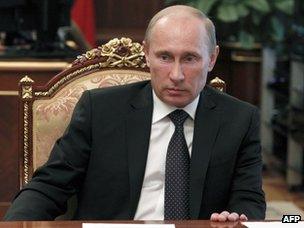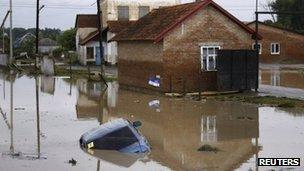Russian TV promotes Putin during flood crisis
- Published

Vladimir Putin likes to be seen taking charge of events
Russia's state TV is facing criticism over its coverage of the recent flood crisis, including its failure to interrupt entertainment shows to provide up-to-date coverage of the tragedy - until the arrival on the scene of President Vladimir Putin.
The floods in the southern region of Krasnodar killed at least 170 people.
As evidence mounted during 7 July of the terrible havoc wreaked the previous night, Russia's main TV stations - official channel Rossiya 1, state-controlled Channel One and Gazprom-owned NTV - carried regular reports from the disaster area in their scheduled bulletins.
But even when the death toll was around 100 and rising, they did not make room for any special news bulletins and carried on with their normal programmes.
These included light-hearted comedy and cabaret shows - something which caused outrage among a number of Russian Twitter users.
Although the floods topped the main evening bulletins, they did not dominate them.
Just over 12 minutes of Rossiya 1's hour-long primetime Vesti v Subbotu (News on Saturday) was devoted to the disaster, with almost as much time being given over to a report about the redevelopment of Moscow and an interview with a pro-Kremlin politician about a controversial bill affecting the status of Russian NGOs.
Commenting on the coverage on his Facebook page on 7 July, former NTV presenter Anton Krasovskiy said the fact that not one national channel was carrying round-the-clock coverage from the disaster zone was a "crime".
Putin appearance delayed
This was not the only notable anomaly in the day's TV coverage. Another was the absence from the screens of Mr Putin.
As a rule, Mr Putin dominates Russian TV news. But all through the day and into the evening on 7 July, bulletins came and went without the country's leader appearing to give a response to the tragedy.
Russian state TV's behaviour changed abruptly at just before 23:20 Moscow time, when Rossiya 1 and Channel One broke into their regular programming to bring viewers special bulletins devoted exclusively to the aftermath of the floods.
As Russian media academic Anna Kachkayeva observed on Radio Liberty, the "trigger mechanism" for this change appeared to be less a desire to address the concerns of the public than the arrival of Mr Putin on the scene.
For here, at last, was the president flying in a helicopter over the disaster zone, grilling a local official about allegations that people had not been warned of the impending flood and issuing orders for the provision of humanitarian assistance.
Or, as Ms Kachkayeva put it: "The hero arrived, sorted everything out and asked all the questions".

The plight of Krymsk did not get special attention until the president arrived
'Service and subordination'
As distinguished TV presenter and opposition activist Leonid Parfenov observed in a much-discussed speech in 2010, news and current affairs programmes on Russian state TV primarily serve the purposes of the governing elite.
Mr Parfenov said that a state TV correspondent was not really a journalist, but a "functionary who follows the logic of service and subordination".
And one of state TV's most important functions seems to be to show Mr Putin as a dynamic man of action, not merely commenting on events, but taking charge of them.
During the forest fire crisis in 2010, they even went so far as to show him taking the controls of one of the aircraft that was putting out the blaze.
Kursk
The care with which the Kremlin spin-doctors and their colleagues in state media handle Mr Putin's image during times of crisis probably owes much to the lessons learned from his handling of the Kursk submarine tragedy in August 2000.
The Russian media (which were a lot freer at that time) severely criticised the new president for (among other things) carrying on with his holiday at a Black Sea resort as the tragedy unfolded.
He made his first televised statement on the Kursk when he was still at the resort. A leading newspaper described him as looking "tanned and even slightly sunburned".
The following month, Putin was also widely criticised for his apparently offhand reply to CNN's Larry King inquiry about the fate of the Kursk: "It sank".
The phrase may still haunt Putin. Opposition Twitter users were quick to seize on it when commenting on the fate of Krymsk, the town where most of the flood victims perished.
A typical tweet ran: "And now a question for Vladimir Putin. What happened in Krymsk? - They sank."
Speaking on Radio Liberty, Aleksandr Melman, TV critic for mass-market daily Moskovskiy Komsomolets, said Russian TV's response to the recent flood crisis was the "logical outcome of Putin's rule and the type of television associated with it".
BBC Monitoring, external selects and translates news from radio, television, press, news agencies and the internet from 150 countries in more than 70 languages. It is based in Caversham, UK, and has several bureaux abroad. For more reports from BBC Monitoring, click here
- Published25 March 2024
